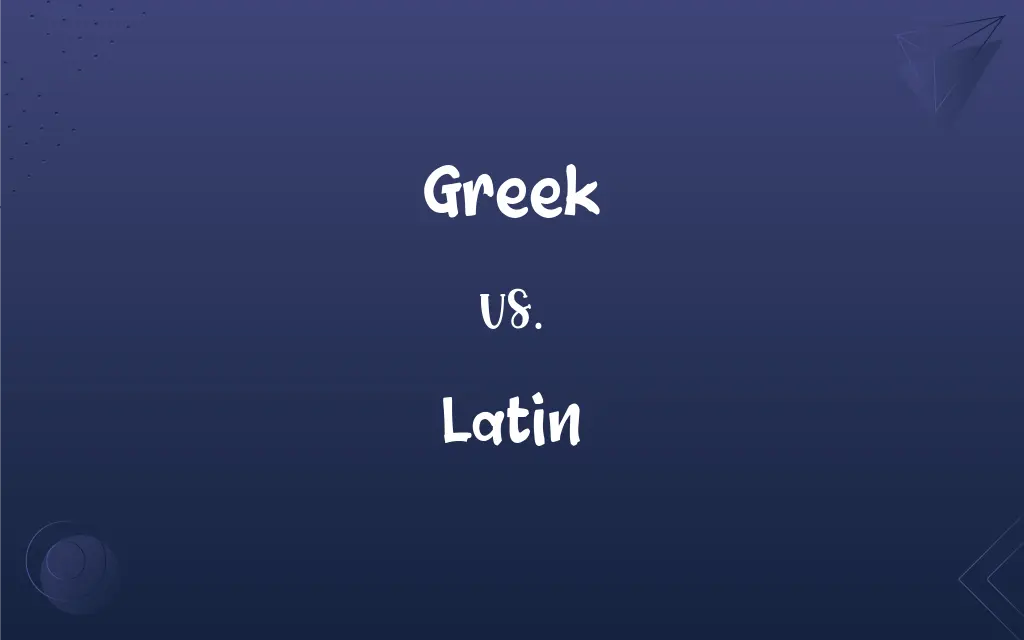Greek vs. Latin: What's the Difference?
Edited by Janet White || By Harlon Moss || Updated on October 19, 2023
Greek pertains to Greece and its language, while Latin is associated with ancient Rome and its language.

Key Differences
Greek refers to anything that is related to Greece, its people, or its language. The Greek language has its roots in the Hellenic branch of the Indo-European language family and has a rich history spanning millennia. Ancient Greek civilization provided foundational contributions to philosophy, politics, and the arts. Many English words, especially in science and medicine, have been derived from Greek roots.
Latin, on the other hand, pertains to ancient Rome, its people, and its primary language. The Latin language has had a profound influence on many modern languages, especially the Romance languages like Spanish, French, and Italian. Latin was the lingua franca of the Roman Empire, which spanned vast territories across Europe, Asia, and Africa. Even today, Latin phrases are integrated into legal, scientific, and religious contexts.
While Greek and Latin are both ancient languages, their scripts differ considerably. Greek uses the Greek alphabet, which has been in existence since the 9th or 8th century BCE. Latin, meanwhile, uses the Latin alphabet, which is the precursor to the alphabets of many modern languages, including English.
Greek culture and Latin (or Roman) culture have both left indelible marks on the development of Western civilization. From Greek, we derive foundational concepts in democracy, theater, and philosophy. From the Romans, we've inherited key principles of law, governance, and infrastructure.
In terms of linguistic legacy, Greek and Latin are monumental. The Renaissance period saw a revival in the study of both languages, leading to the Classical education model. Today, while neither Greek nor Latin is spoken widely as a daily language, both remain subjects of study, symbolizing the rich tapestry of human history and thought.
ADVERTISEMENT
Comparison Chart
Origin
Originates from Greece
Originates from ancient Rome
Script
Uses the Greek alphabet
Uses the Latin alphabet
Modern Influence
Major influence on scientific and medical terminology
Basis for Romance languages and many legal terms
Ancient Civilization
Associated with philosophers like Plato and historical events like Trojan War
Associated with Roman emperors and events like the founding of Rome
Revival
Integral to Byzantine and Orthodox Christian traditions
Central to Catholic Church liturgy and Renaissance humanist studies
ADVERTISEMENT
Greek and Latin Definitions
Greek
Of or relating to Greece, its people, or its language.
The Greek islands are a popular tourist destination.
Latin
The language of ancient Rome.
He studied Latin for four years in school.
Greek
A native or inhabitant of Greece.
He is a Greek by birth but has lived in France for many years.
Latin
Pertaining to the peoples or countries using Romance languages.
Latin dance styles are energetic and expressive.
Greek
The Hellenic language spoken in Greece.
She is fluent in both English and Greek.
Latin
Of or relating to ancient Rome, its people, or its language.
The Latin inscriptions were carved into the stone.
Greek
Confusing or hard to understand (slang).
Quantum physics is all Greek to me.
Latin
Relating to the Latin Church or the Western Christian Church.
The mass was conducted in Latin.
Greek
Pertaining to Greek Orthodox Christianity.
They attended a Greek Easter celebration.
Latin
A person from Latin America.
The music had a Latin rhythm that made everyone dance.
Greek
The Indo-European language of the Greeks.
Latin
The Indo-European language of the ancient Latins and Romans and the most important cultural language of western Europe until the end of the 17th century.
Greek
Greek language and literature from the middle of the eighth century BC to the end of the third century AD, especially the Attic Greek of the fifth and fourth centuries BC.
Latin
The Latin language and literature from the end of the third century BC to the end of the second century AD.
FAQs
Are Greek and Latin similar languages?
While both are Indo-European languages, Greek and Latin have distinct linguistic roots and structures.
Do people still speak Greek?
Yes, Greek is the official language of Greece and is spoken by millions.
What is Greek primarily associated with?
Greek is primarily associated with Greece, its people, and its language.
Where was Latin predominantly spoken?
Latin was the lingua franca of the Roman Empire.
Did Romans speak both Greek and Latin?
Many educated Romans spoke both languages, as Greek was the language of culture and scholarship.
What is Latin known for?
Latin is known for its association with ancient Rome and its language.
Is Latin a dead language?
While not spoken conversationally, Latin is studied academically and used in religious, legal, and scientific contexts.
How does the Greek alphabet differ from the Latin alphabet?
The Greek alphabet has unique characters and is distinct from the Latin alphabet used by English and other languages.
Are there modern versions of the Greek language?
Yes, Modern Greek is the contemporary version and is different from Ancient Greek.
Why is Latin taught in schools?
Latin is taught for its cultural, historical, and linguistic importance, and it aids in understanding many modern languages.
How old is the Greek language?
Greek has been spoken for over 3,000 years, with roots in the Bronze Age.
Why is Greek influential in science?
Many scientific terms are derived from Greek roots.
What are some Roman contributions influenced by Latin?
Romans contributed to governance, architecture, law, and infrastructure.
Is Greek mythology written in Greek?
Yes, ancient Greek mythology was written in the Greek language.
Was Latin ever a global lingua franca?
Yes, during the Roman Empire, Latin was a widespread lingua franca.
How did Greek philosophy influence Western thought?
Greek philosophy laid foundational ideas in logic, ethics, and metaphysics, influencing Western intellectual traditions.
Why is Latin important in modern times?
Latin has influenced many modern languages and is foundational in legal, scientific, and religious terms.
What are some cultural contributions of ancient Greece?
Ancient Greece contributed to democracy, philosophy, theater, and the Olympic games.
How has Latin influenced modern English?
Many English words, especially in legal and scientific contexts, have Latin roots.
How have Greek and Latin influenced modern academia?
Both languages are central to classical studies, influencing literature, history, philosophy, and linguistics.
About Author
Written by
Harlon MossHarlon is a seasoned quality moderator and accomplished content writer for Difference Wiki. An alumnus of the prestigious University of California, he earned his degree in Computer Science. Leveraging his academic background, Harlon brings a meticulous and informed perspective to his work, ensuring content accuracy and excellence.
Edited by
Janet WhiteJanet White has been an esteemed writer and blogger for Difference Wiki. Holding a Master's degree in Science and Medical Journalism from the prestigious Boston University, she has consistently demonstrated her expertise and passion for her field. When she's not immersed in her work, Janet relishes her time exercising, delving into a good book, and cherishing moments with friends and family.































































